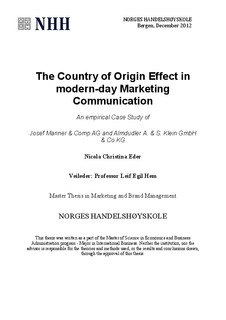The country of origin effect in modern-day marketing communication : an empirical case study of Josef Manner & Comp AG and Almdudler A. & S. Klein GmbH & Co KG
Master thesis
Permanent lenke
http://hdl.handle.net/11250/169457Utgivelsesdato
2012Metadata
Vis full innførselSamlinger
- Master Thesis [4372]
Sammendrag
The following thesis seeks to explore the application and underlying motivation of companies
to integrate the country of origin information as an essential part of their marketing
communication efforts.
Based on research on the theoretical frameworks and concepts developed with relevance to
the “country-origin-effect”, the empirical analysis conducted through qualitative research of
two companies originating from Austria serve as case studies.
The research strives to illustrate the company perspective and the intended effect on the
consumer including an investigation of the portfolio of communication tools applied.
Drawing on the concept of “Brand Origin” and “Brand Equity” the paper reveals that the
country of origin information communication of Austria is intended to evoke associations on
the cognitive as well as on the emotional level. It serves as a tool of differentiation, indicates
quality and therefore allows for a premium positioning in the market.
Important considerations on behalf of the company include the loss of control due to the use
of secondary brand associations, the active management and monitoring of the origin cue and
what it stands for over the product-life-cycle as well as cautious application of concepts such
as consumer patriotism and within country perception considerations.
Furthermore the two case companies leverage on the origin cue not only as a secondary brand
association, but incorporate it as an essential part of their brand. The country of origin is
prevalent throughout the large portfolio of communication tools to create relevance and brand
tangibility to the customer.
